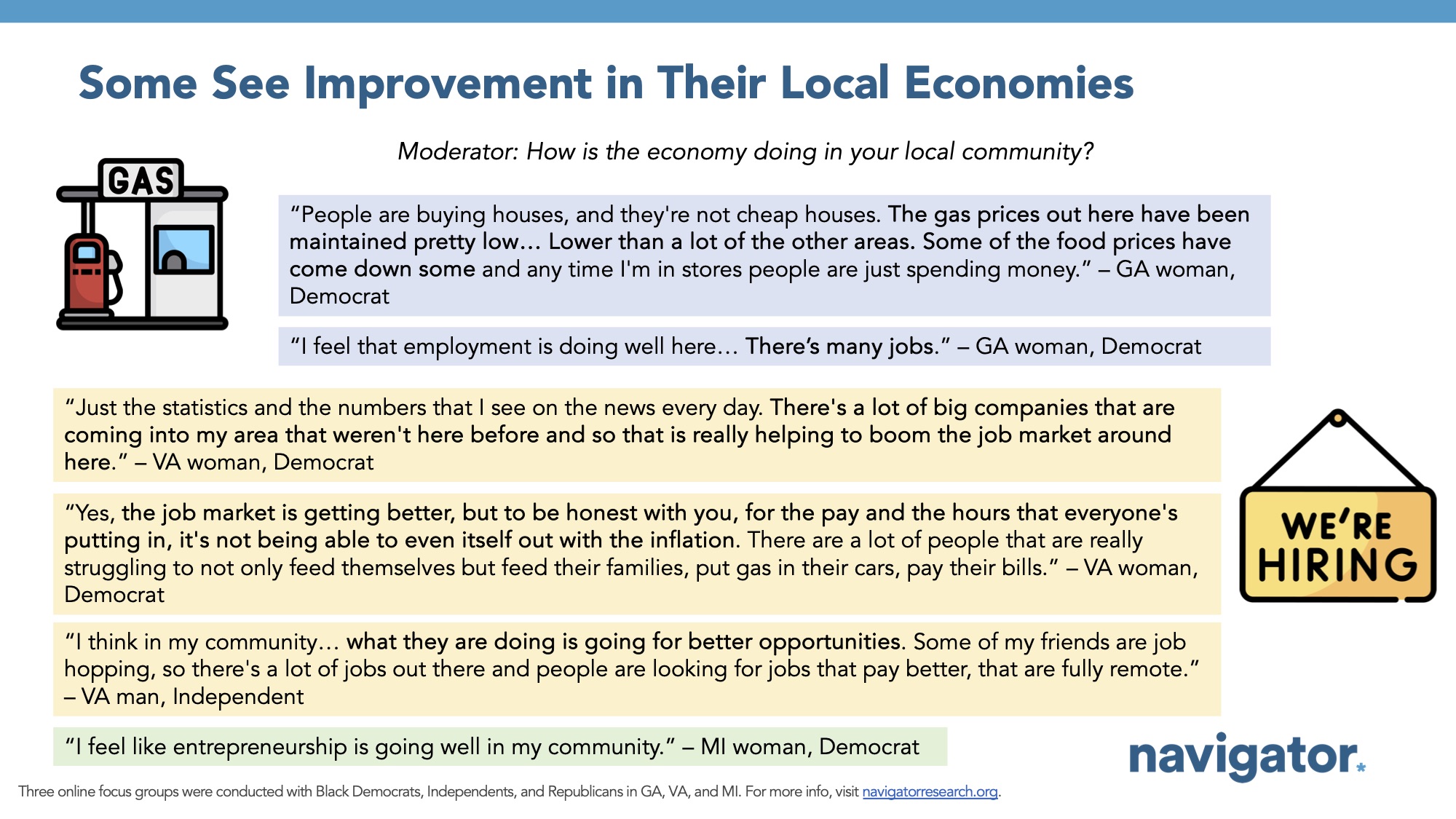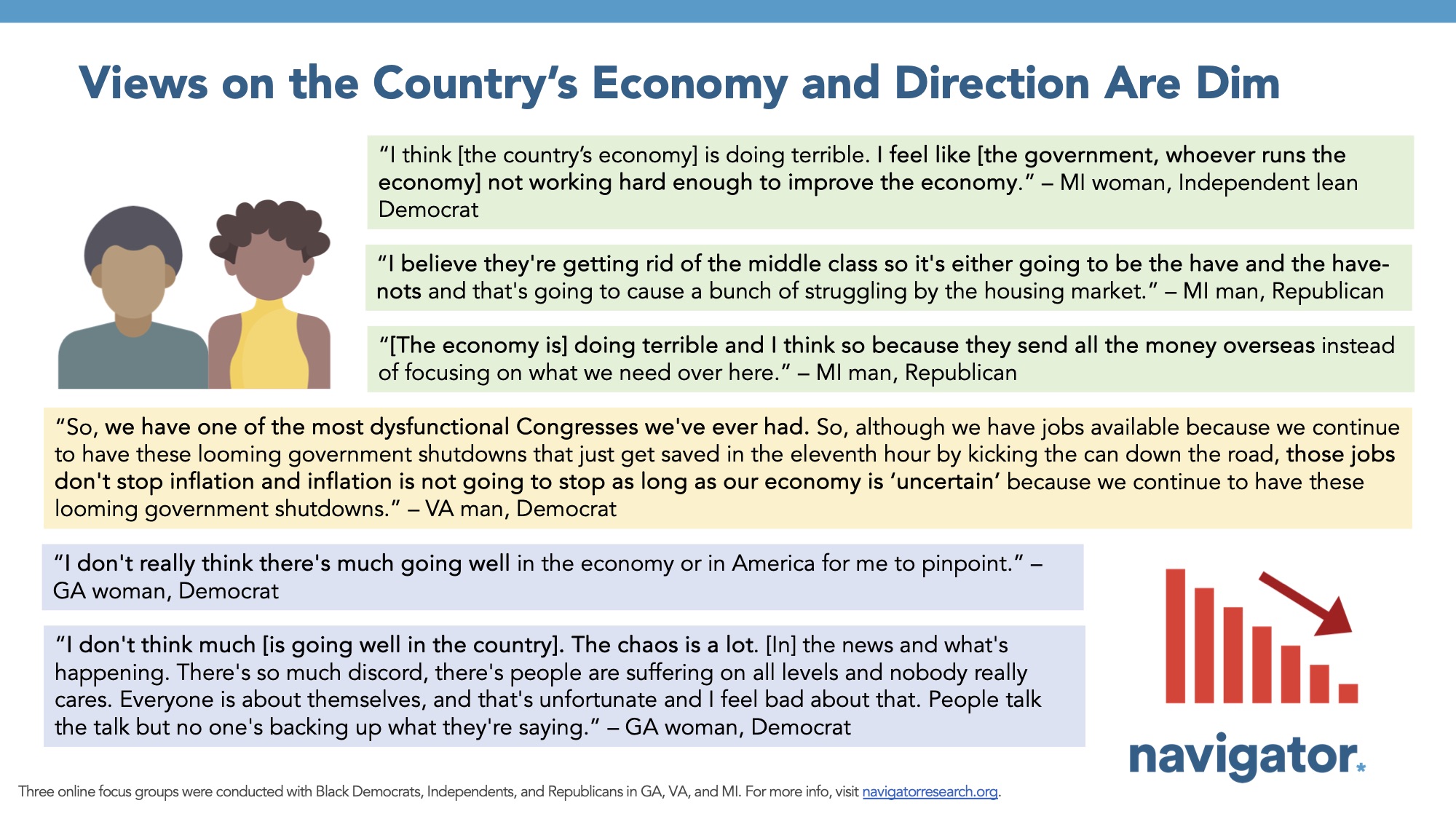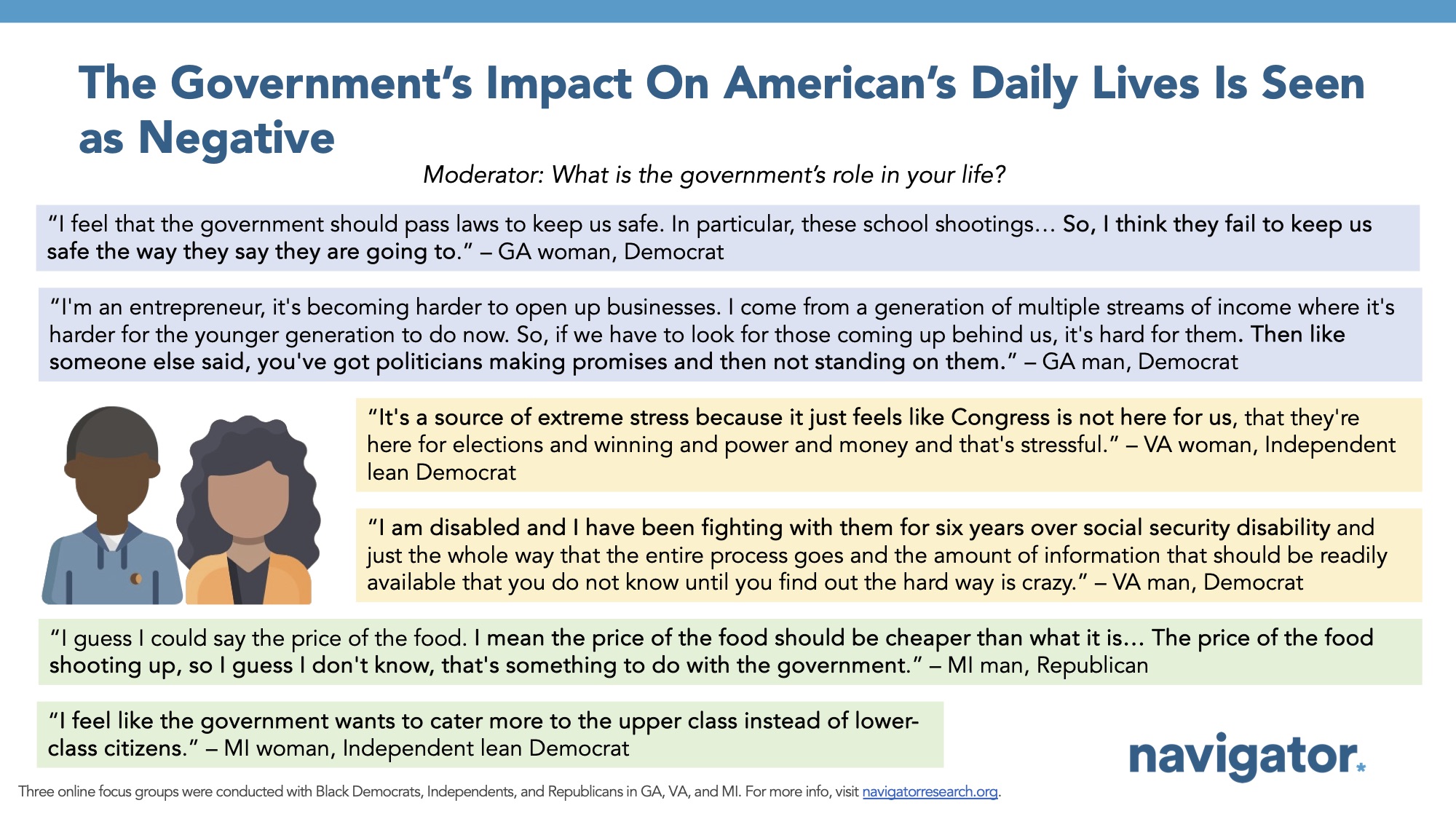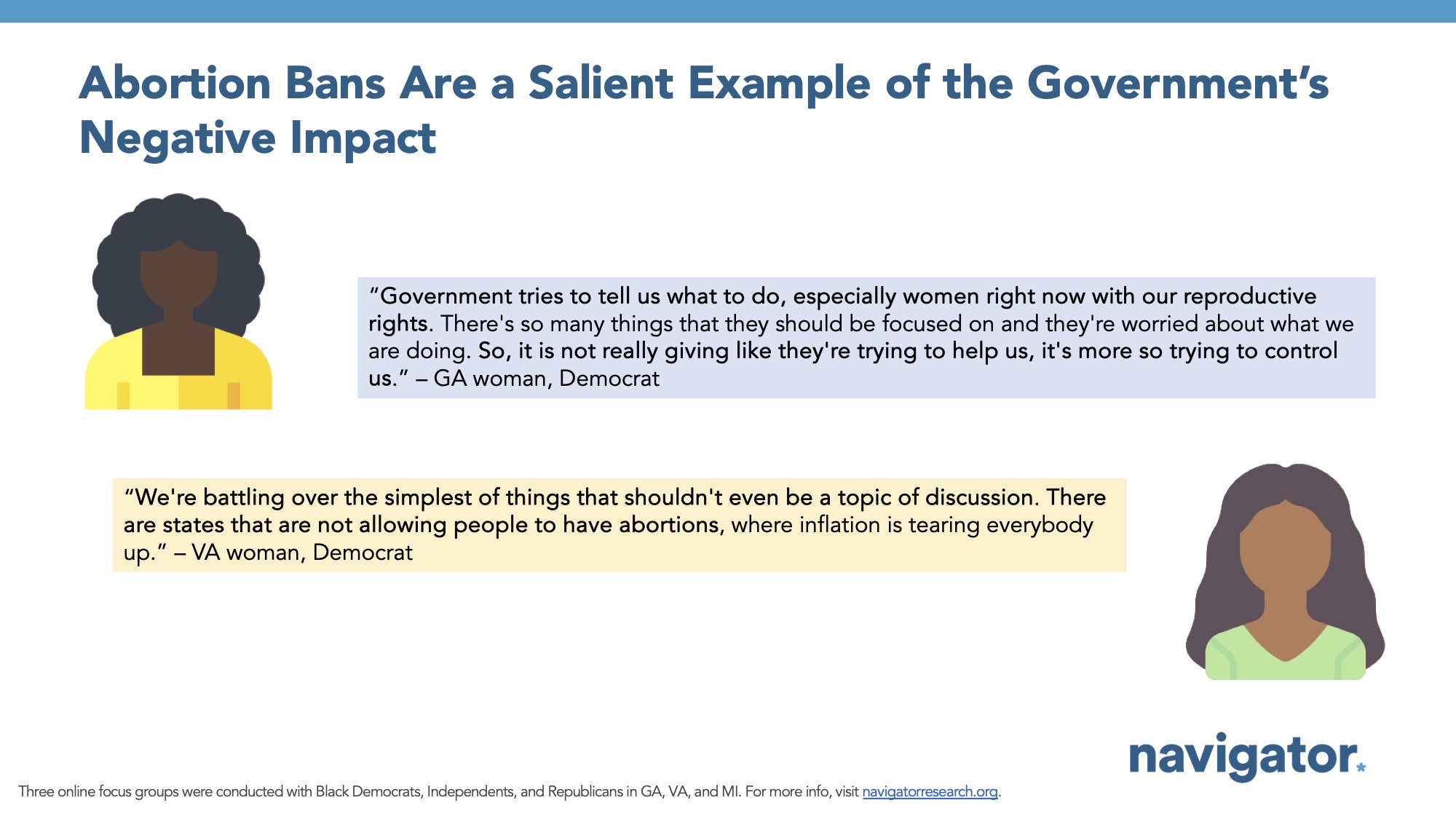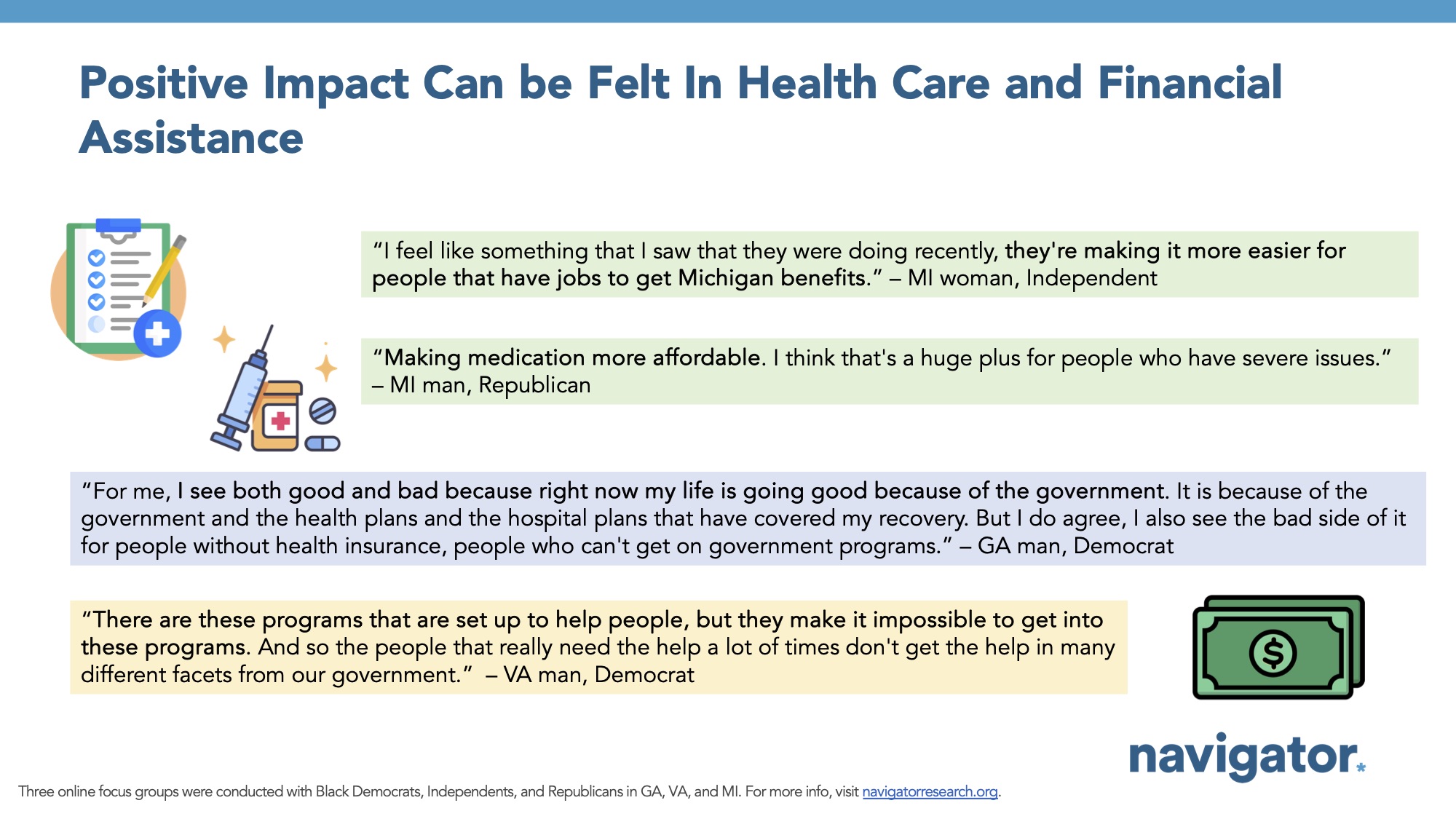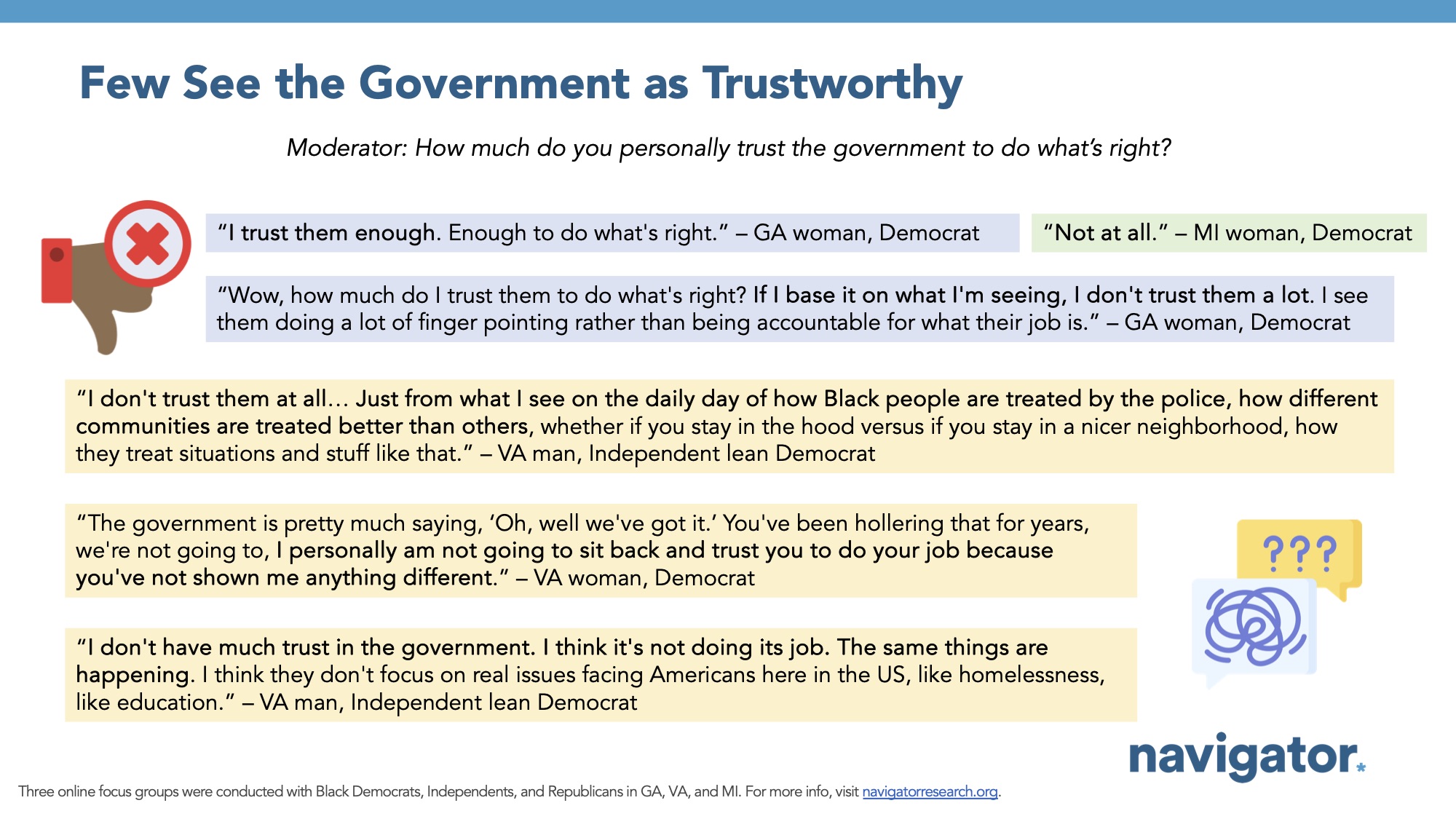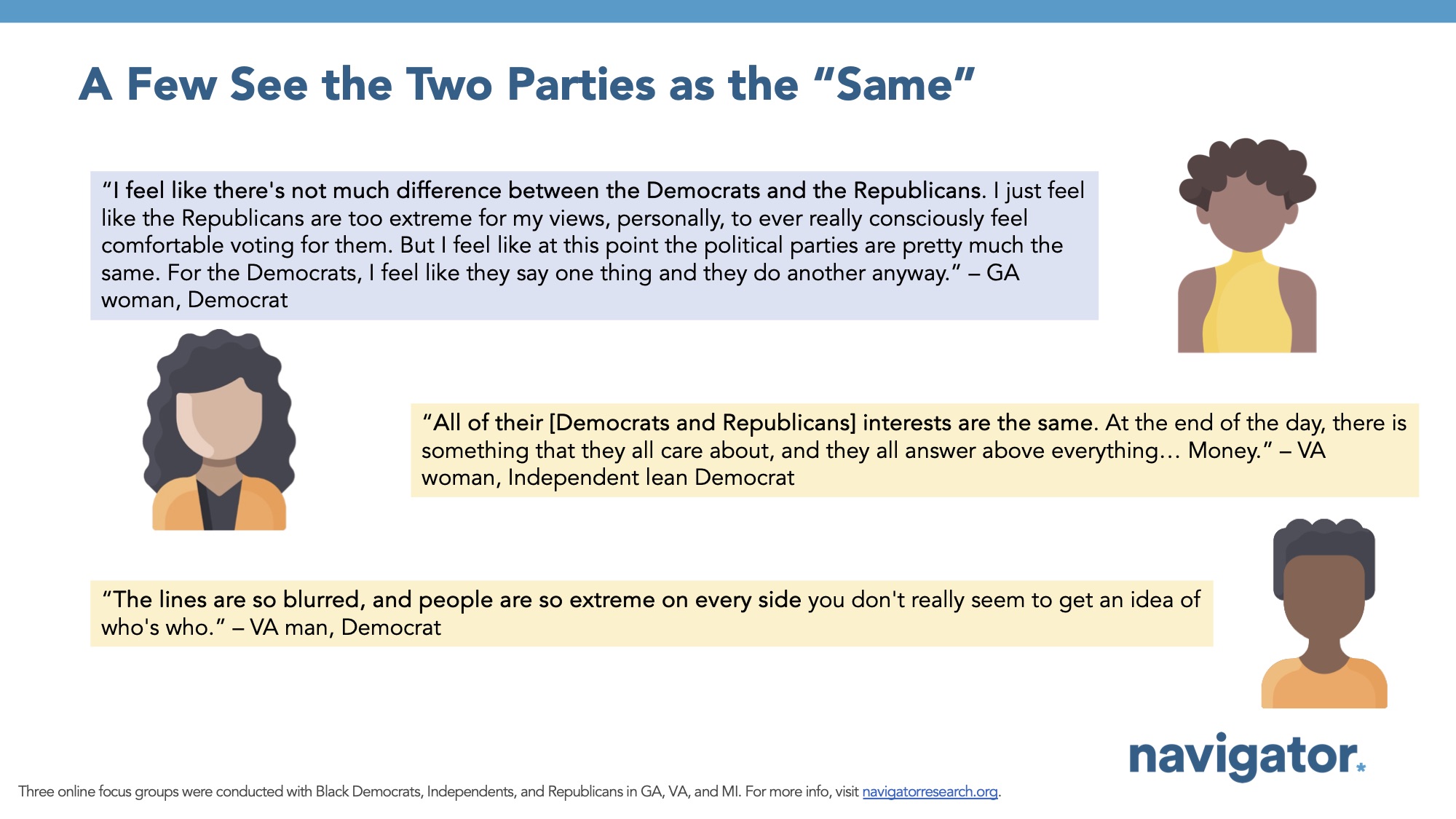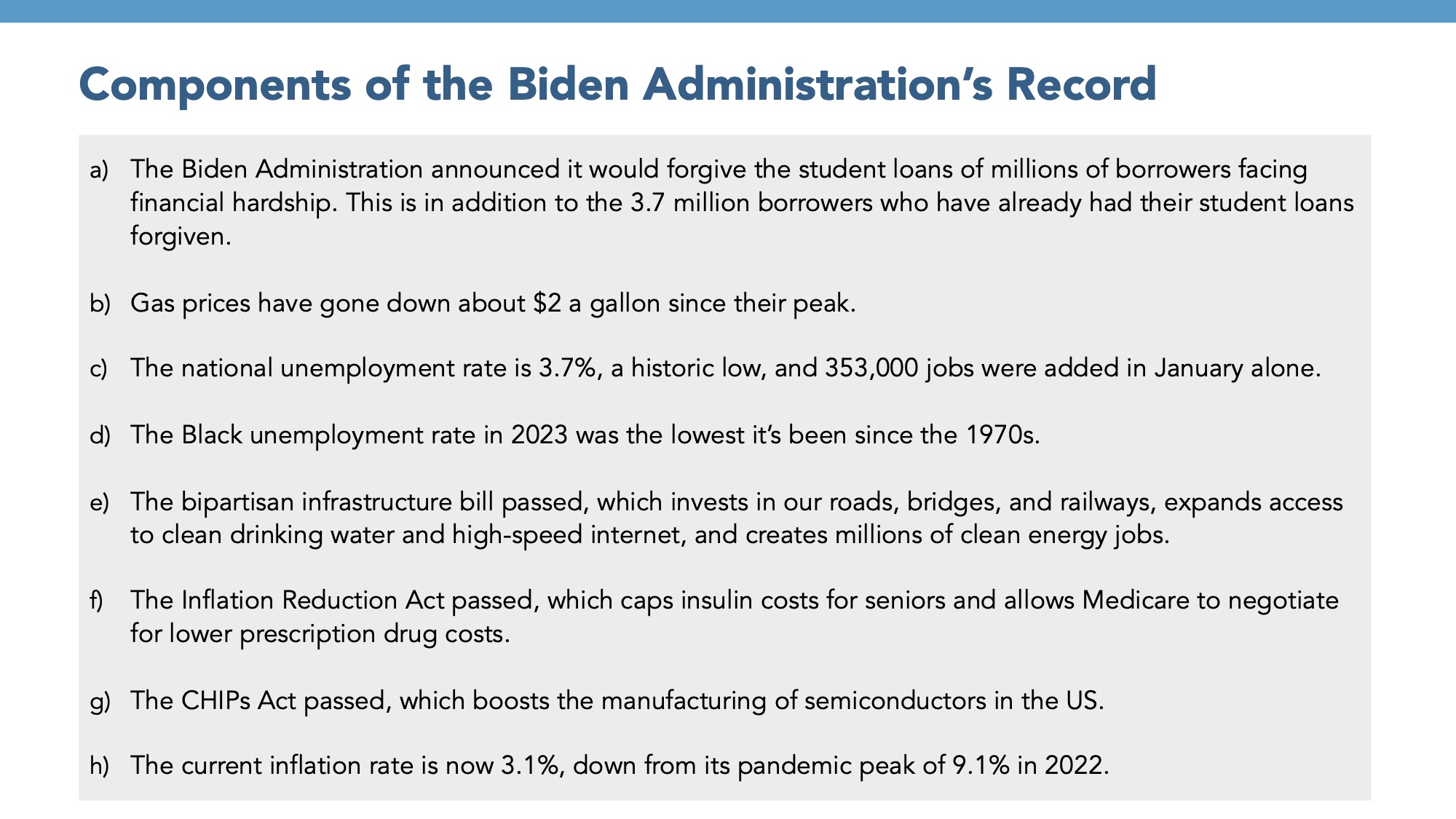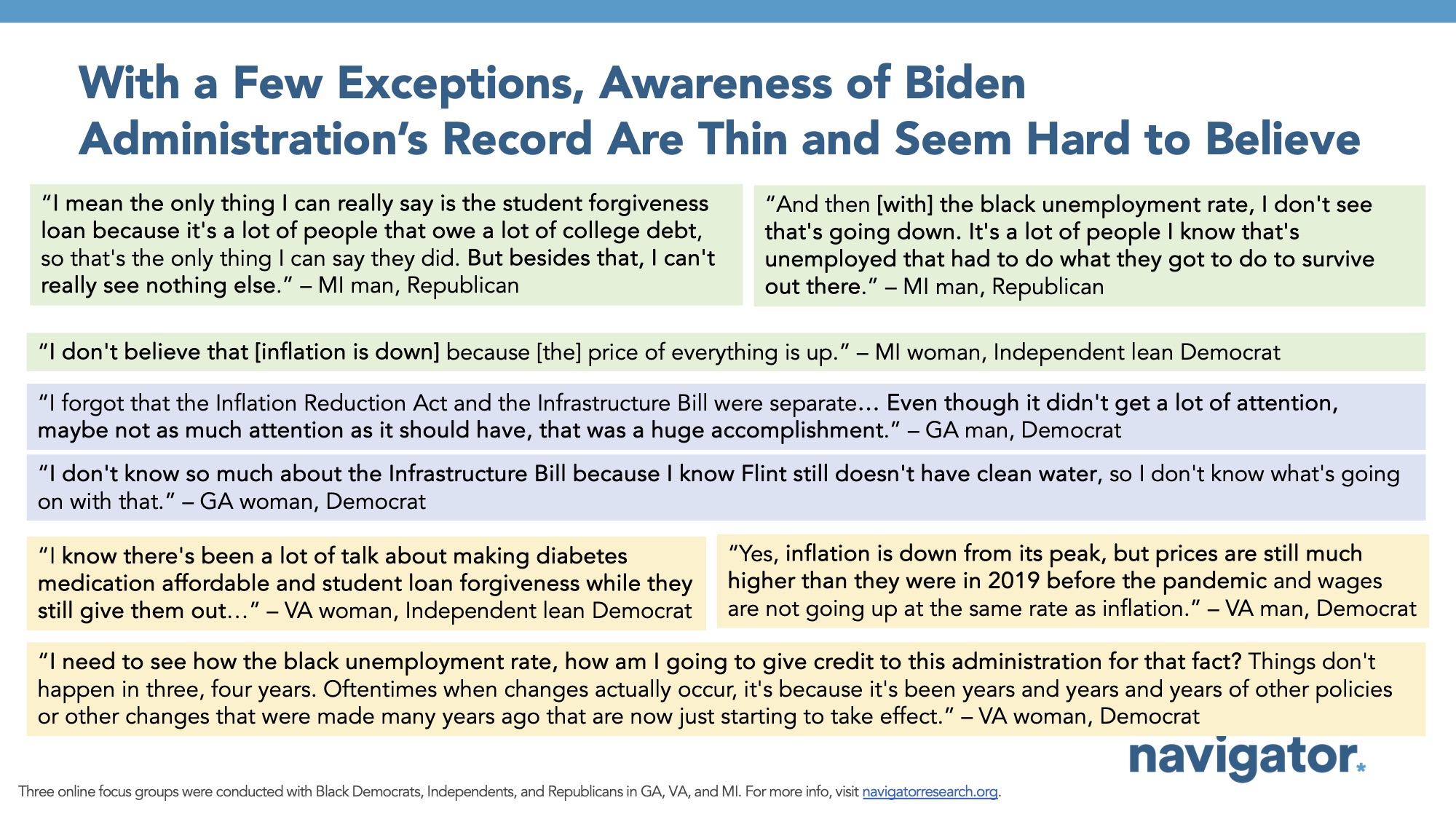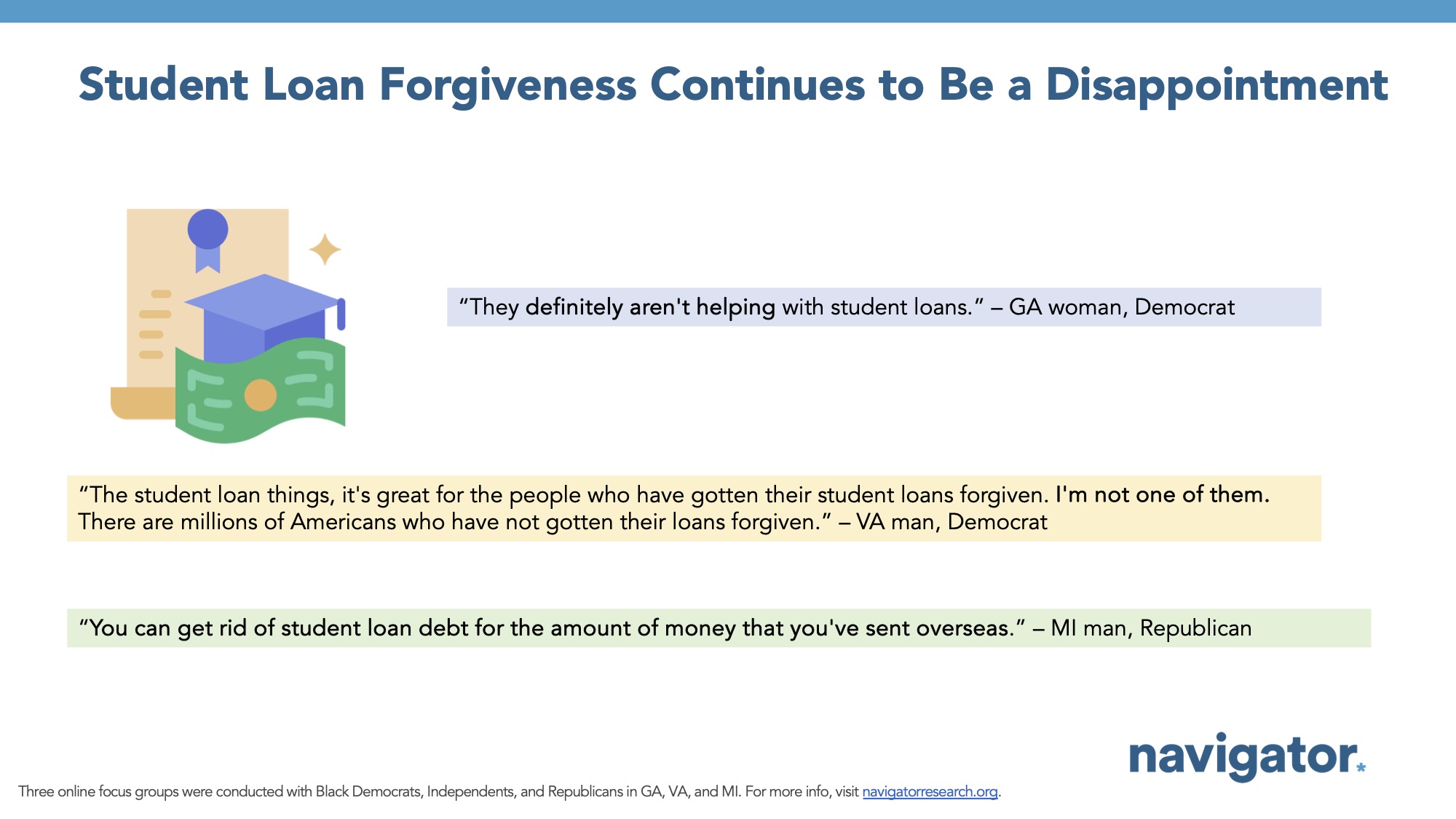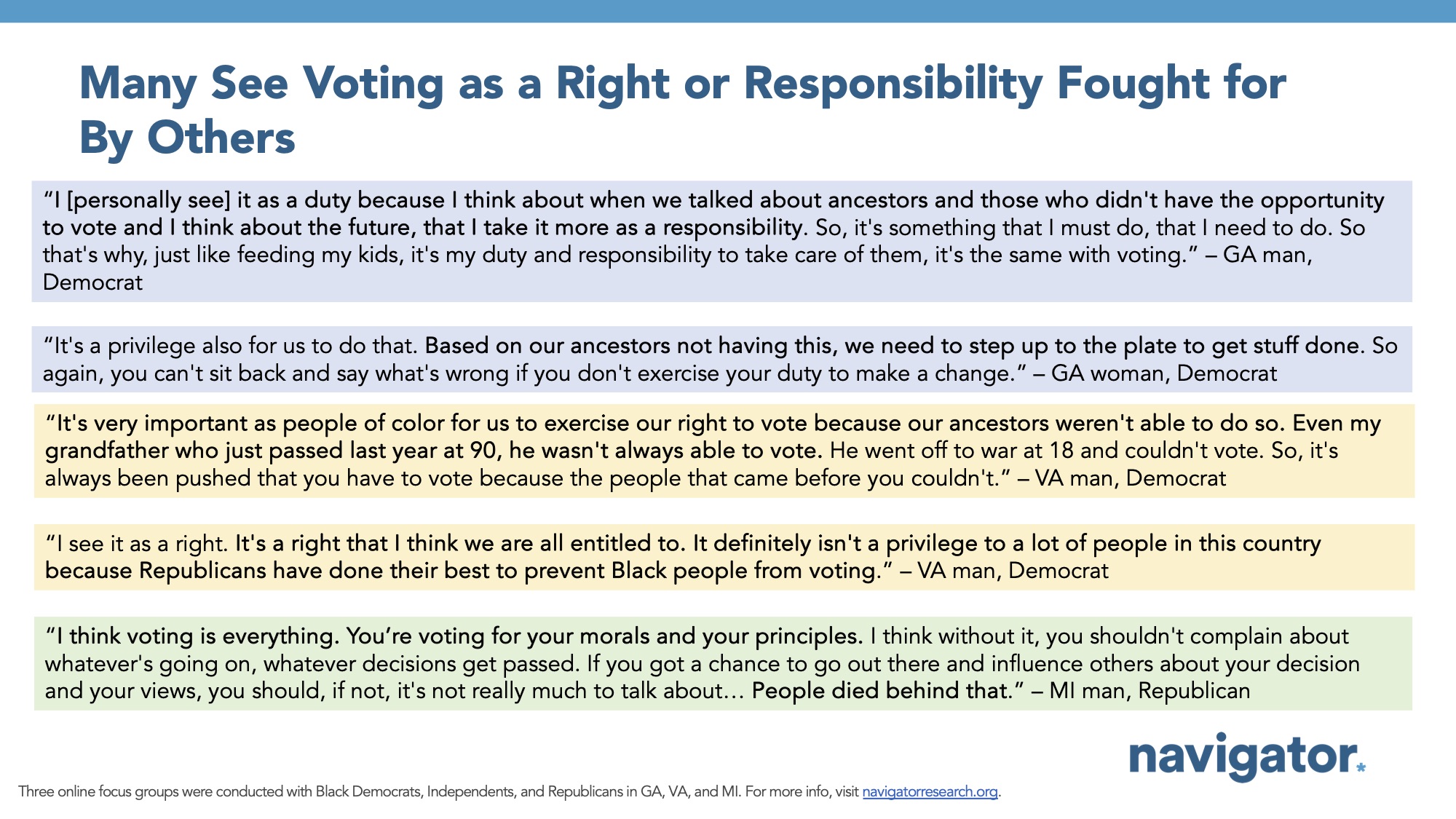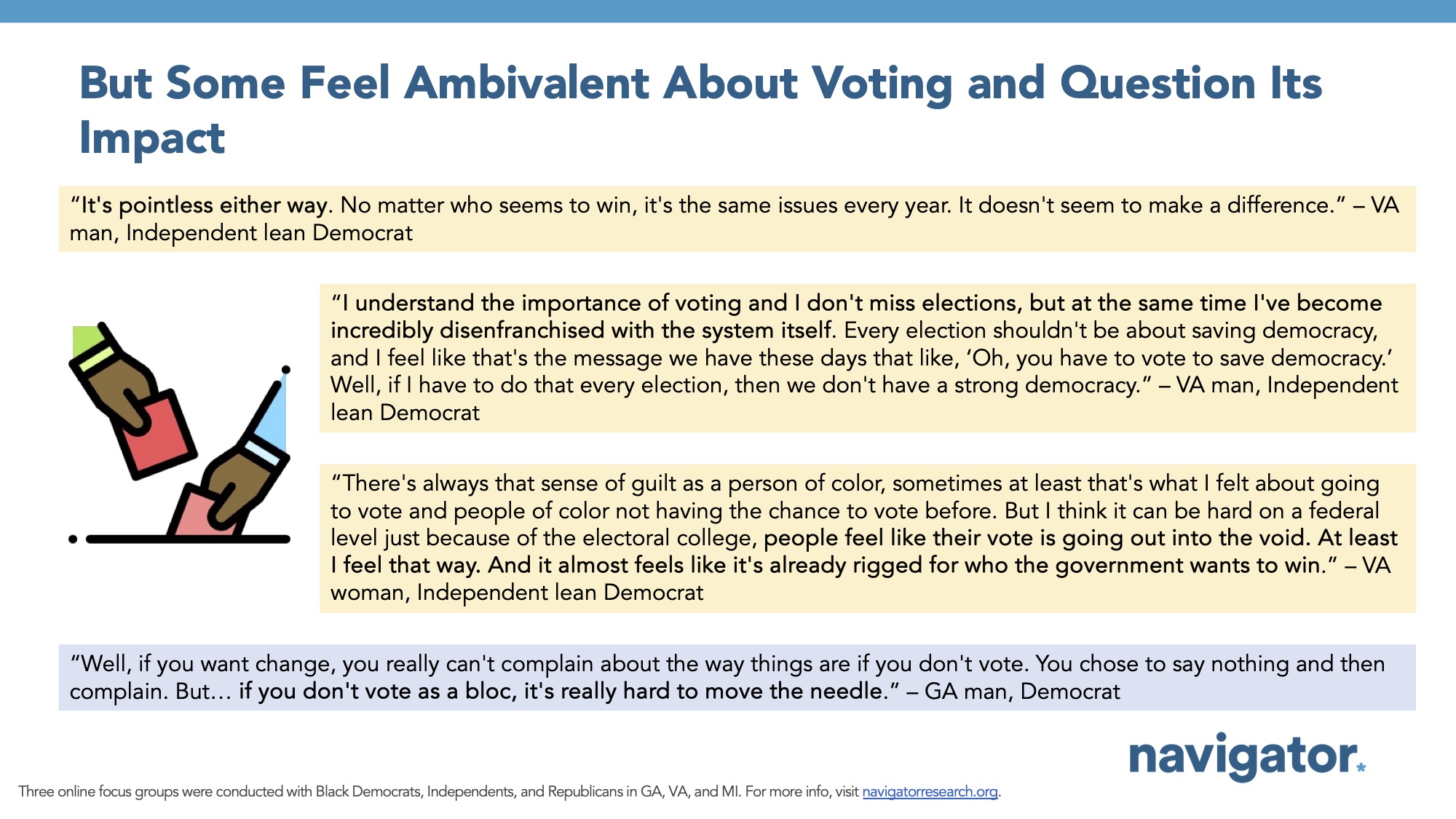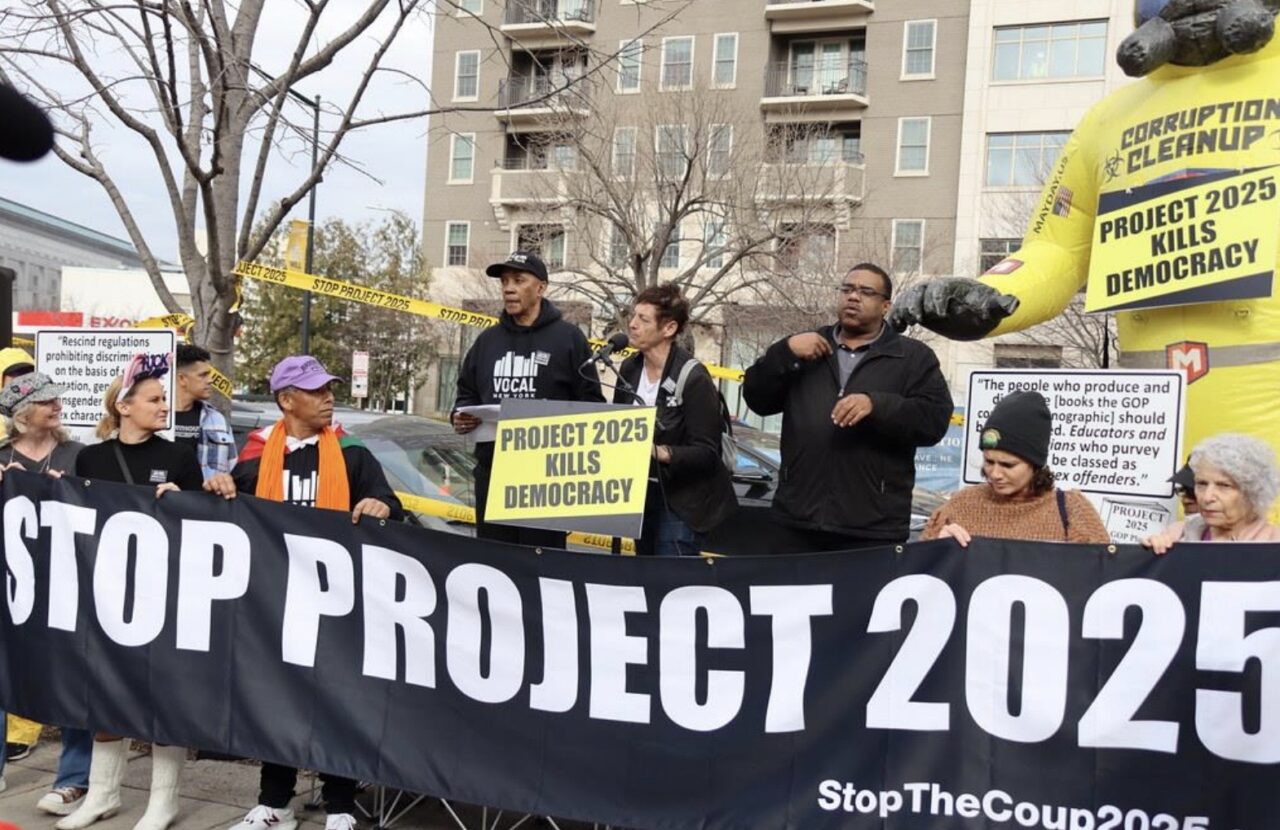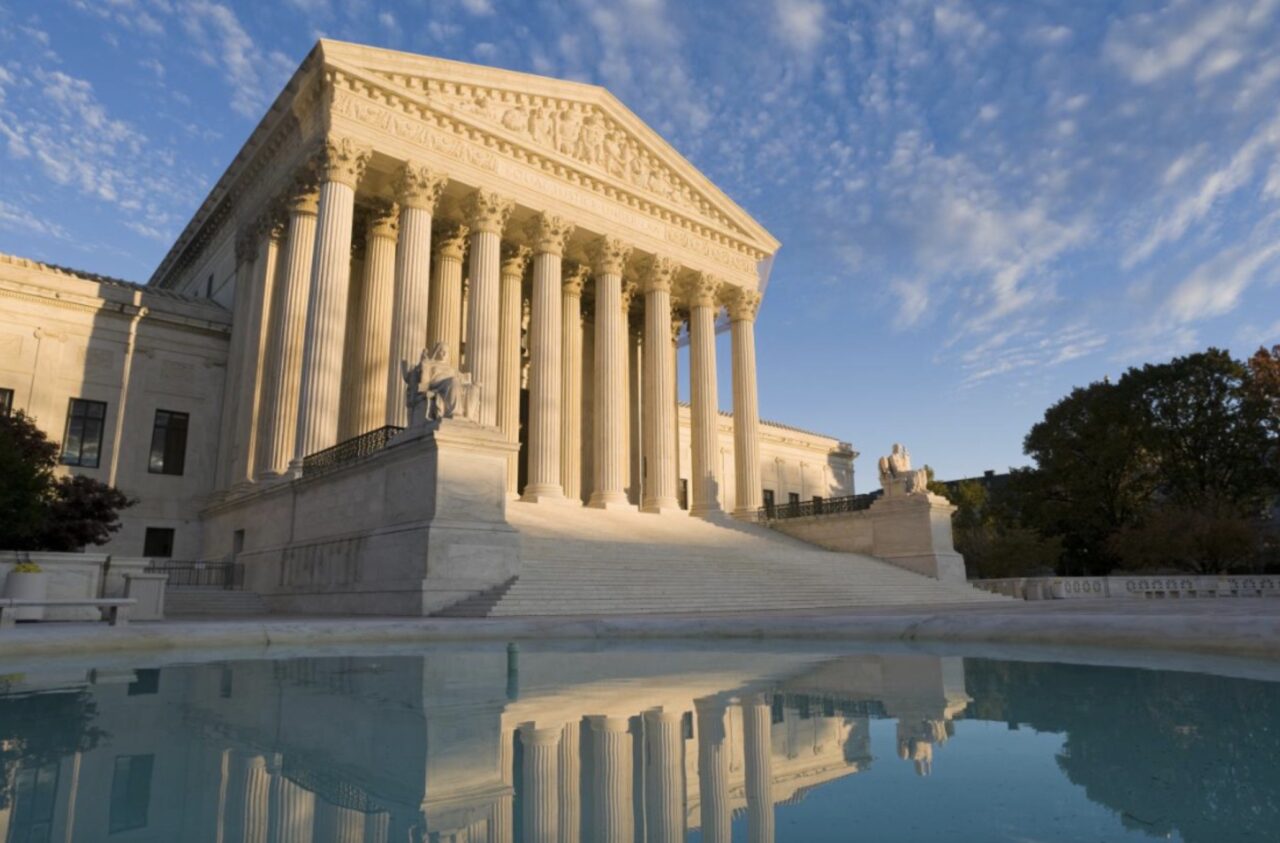Focus Groups: Black Americans in Michigan, Georgia, Virginia
This Navigator Research report contains findings from focus groups among Black Americans in Georgia, Virginia, and Michigan on the state of the country, trust in government, civic engagement, and the Biden administration.
Participants were optimistic about their communities’ economy, but more pessimistic about the state of the national economy.
Many people cited seeing more job opportunities in their communities, and felt more optimism about the economic state of their local communities. One Democrat in Georgia expressed hope about her local community: “I feel that employment is doing well here… there’s many jobs..” However, this optimism was tempered by questioning the salaries of new positions matching the new demands of inflation, where many participants pivoted toward a perception that the national economy is still in poor shape. Participants still felt the pain of inflation, as others felt the middle class is disappearing with increasingly smaller shares who are thriving in today’s economy.
- However, one participant in Virginia felt the rate of inflation adversely affected the job market: “Yes, the job market is getting better, but to be honest with you, for the pay and the hours that everyone’s putting in, it’s not being able to even itself out with the inflation… there are a lot of people that are really struggling to not only feed themselves but feed their families, put gas in their cars, pay their bills.”
- A Republican in Michigan also expressed negativity about the national state of the economy, “I believe they’re getting rid of the middle class so it’s either going to be the have and the have-nots and that’s going to cause a bunch of struggling by the housing market.”
- A Democrat in Georgia stated: “I don’t think much [is going well in the country]. The chaos is a lot. [In] the news and what’s happening. There’s so much discord, there’s people are suffering on all levels and nobody really cares. Everyone is about themselves, and that’s unfortunate and I feel bad about that. People talk the talk but no one’s backing up what they’re saying.”
Participants pointed towards health care when defining a positive role of government in their everyday lives; however, most felt the overall impact of government to be negative, with several citing the loss of abortion rights as an example.
There was a strong sentiment that government was not focused on the issues affecting Americans, which one Virginian described as: “It just feels like Congress is not here for us, that they’re here for elections and winning and power and money and that’s stressful.” A Democrat in Georgia said, “I feel that the government should pass laws to keep us safe. In particular these school shootings… so I think they fail to keep us safe the way they say they are going to.”
- Yet some participants cited the reduced cost of medication and making health care more accessible and affordable as a positive impact of the government in their lives. One Democrat in Virginia shared their experience: “I am disabled and I have been fighting with them for six years over Social Security disability and just the way that the entire process goes and the amount of information that should be readily available that you do not know until you find out the hard way is crazy.” A Michigan Republican expressed:, “Making medication more affordable. I think that’s a huge plus for people who have severe issues.”
- A few felt abortion bans were symbolic of the government being focused on the wrong issues. A Georgia Democrat said: “Government tries to tell us what to do, especially women right now with our reproductive rights. There’s so many things that they should be focused on and they’re worried about what we are doing. So it is not really giving like they’re trying to help us, it’s more so trying to control us.”
Trust in the government is thin, including among Democrats, with participants either feeling the two parties are too similar.
When asked to assess how much trust people had in the government, many said “not much” or “I don’t trust them at all.” Many blamed the broken policies of government officials for their erosion, as an independent from Virginia explained: “They’re not listening and focusing on our needs.” An independent in Virginia said: “All of their [Democrats and Republicans] interests are the same. At the end of the day, there is something that they all care about and they all answer above everything… Money.”
Awareness of the Biden administration’s record was thin, though the inability to cancel a portion of student loan debt is a primary example of ineffectiveness.
When shown a list of actions taken by the Biden administration while in office, many were surprised or found it hard to believe. There was little knowledge of the infrastructure bill and disbelief about the lowering inflation rate in particular. When people read about canceling a portion of student loan debt, many expressed disappointment they had not seen it happen.
- One Republican in Michigan said: “And then [with] the black unemployment rate, I don’t see that’s going down. It’s a lot of people I know that’s unemployed that had to do what they got to do to survive out there.”
- A Democrat in Georgia said: “I forgot that the Inflation Reduction Act and the Infrastructure Bill were separate… Even though it didn’t get a lot of attention, maybe not as much attention as it should have, that was a huge accomplishment,”
- A Virginia Democrat expressed: “The student loan things, it’s great for the people who have gotten their student loans forgiven. I’m not one of them. There are millions of Americans who have not gotten their loans forgiven,” along with a Democrat in Georgia also felt disappointed with the outcomes of student loan debt cancellation, “they definitely aren’t helping with student loans.”
Many see voting as a right or responsibility fought for by others, while some feel ambivalent about voting and question its impact.
A number of participants felt voting is a duty, with one Georgia Democrat saying: “When we talked about ancestors and those who didn’t have the opportunity to vote and I think about the future, that I take it more as a responsibility.” This sentiment was seen across all three focus groups. A Georgia Democrat stated: “The reason why I chose duty, because I believe that’s something that also, again, it’s a privilege also for us to do that. Based on our ancestors not having this, we need to step up to the plate to get stuff done. So again, you can’t sit back and say what’s wrong if you don’t exercise your duty to make a change.” A Republican in Michigan felt, “I think voting is everything. You’re voting for your morals and your principles. I think without it, you shouldn’t complain about whatever’s going on, whatever decisions get passed. If you got a chance to go out there and influence others about your decision and your views, you should, if not, it’s not really much to talk about… People died behind that.”
- However, some felt voting was pointless due to the lack of change in government, with one independent in Virginia describing themselves as “incredibly disenfranchised with the system itself.” An independent-leaning Democrat said: “There’s always that sense of guilt as a person of color, sometimes at least that’s what I felt about going to vote and people of color not having the chance to vote before. But I think it can be hard on a federal level just because of the electoral college, people feel like their vote is going out into the void. At least I feel that way. And it almost feels like it’s already rigged for who the government wants to win.”
About The Study
GBAO conducted three online focus groups February 20, 2024 with Black Democrats, independents, and Republicans in GA, VA, and MI. Some quotes have been lightly edited for brevity. Qualitative results are not statistically projectable.

